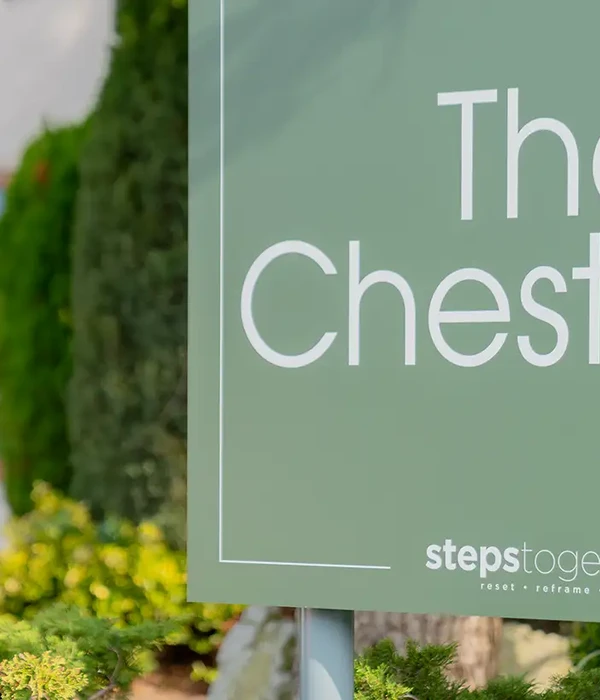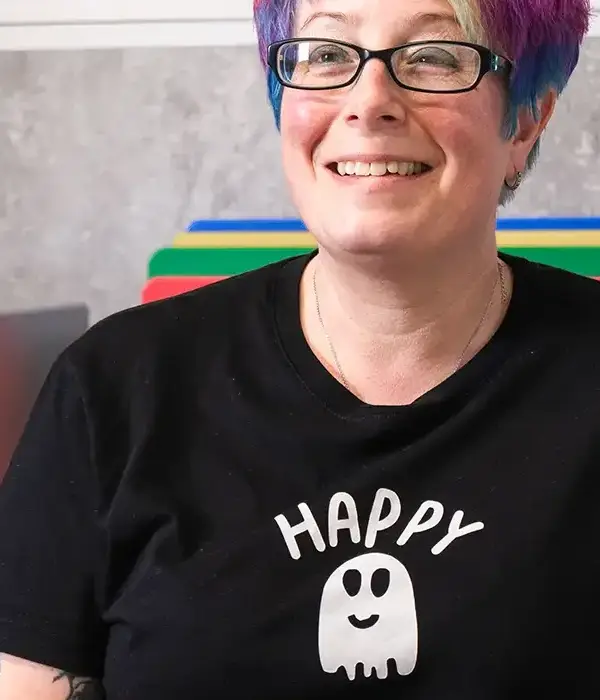Cognitive Behavioural Therapy
At Steps Together, we know how overwhelming it can feel when life’s challenges begin to affect your thoughts, emotions, and daily routines. That’s why we place cognitive behavioural therapy (CBT) at the heart of our care, offering a structured and practical way to address these difficulties. CBT is an evidence-based therapy that helps you understand the links between your thoughts, feelings, and behaviours, and gives you the tools to make lasting, positive changes.
We provide CBT as part of a complete pathway of support, whether through residential treatment, outpatient sessions, or family-inclusive therapies. This flexibility means you can access the right level of care at the right time, with support that adapts to your needs. By combining CBT counselling with our wider therapy modalities, we create a safe space for recovery and growth.
Our approach makes cognitive behavioural treatment accessible, whether you’re managing anxiety, depression, or other challenges. With us, you’ll explore practical strategies that can help you regain control, build resilience, and move forward with confidence.

Start your recovery journey with CBT at Steps Together
We know that taking the first step towards change can feel daunting, which is why we offer a safe and supportive space to begin. Our private CBT sessions give you the chance to explore your thoughts and behaviours in confidence, guided by experienced therapists who understand the challenges of recovery.

What Is Cognitive Behavioural Therapy?
Cognitive Behavioural Therapy (CBT) is a structured form of psychotherapy that helps us recognise unhelpful patterns of thinking and behaviour. By addressing these patterns directly, we can develop practical ways to manage emotional distress and respond more effectively to challenging situations.
How CBT Works
CBT rests on the idea that our thoughts, feelings, and behaviours are closely connected. When we hold negative or distorted beliefs, they can influence how we feel and act, often creating a cycle that reinforces distress. By identifying these patterns, we can begin to challenge and replace them with more balanced perspectives.
This approach is not about ignoring difficulties but about learning to view them more clearly. For example, instead of assuming failure after a setback, we learn to question whether that belief is accurate or helpful. Over time, this reduces the intensity of negative emotions and supports healthier choices.
CBT is widely used in the UK for conditions such as depression, anxiety, phobias, and insomnia. It is also applied in individual therapy settings, including programmes like those offered through Steps Together. Its focus on practical skills makes it suitable for both short-term interventions and longer-term support.


Session Structure and What to Expect
CBT sessions are usually structured and time-limited, often lasting between 30 and 60 minutes. We work with a therapist to set clear goals and focus on specific issues rather than exploring every aspect of our past. This targeted approach helps us make progress within a defined number of sessions.
In the early meetings, we discuss our main concerns and learn how our thoughts and behaviours interact. As therapy continues, we practise new strategies such as keeping thought records, testing out alternative responses, or gradually facing situations we tend to avoid.
Homework is a central part of CBT. Therapists often encourage us to apply techniques between sessions, which strengthens learning and makes changes more lasting. By the final sessions, we usually have a toolkit of practical skills to manage future challenges more effectively.
Conditions CBT Can Help With
Cognitive behavioural therapy supports people facing a wide range of psychological challenges by addressing unhelpful thought patterns and behaviours. It has been shown to improve quality of life in conditions such as depression, anxiety, post-traumatic stress disorder, and difficulties linked to trauma.
Treatment for Depression
CBT for depression focuses on breaking the cycle of negative thinking and low mood that often keeps individuals stuck. We work with people to identify unhelpful thoughts, challenge them, and replace them with more balanced perspectives. This approach helps reduce feelings of hopelessness and encourages healthier daily routines.
Therapy sessions often involve setting small, achievable goals. By encouraging gradual activity and positive reinforcement, CBT helps people regain a sense of control and structure. This can be especially useful in tackling fatigue and loss of interest, which are common in depression.
We also emphasise practical coping strategies, such as problem-solving skills and behavioural activation. These methods allow individuals to re-engage with meaningful activities, improving both motivation and mood. Over time, this structured approach helps reduce the severity and frequency of depressive episodes.
Treatment for PTSD
CBT for PTSD focuses on reducing distress linked to traumatic memories. We guide individuals through processing these experiences in a safe, structured way, helping them reduce flashbacks, nightmares, and heightened alertness.
One common method is trauma-focused CBT, which involves gradually confronting painful memories rather than avoiding them. This helps the brain reprocess the trauma, reducing the emotional intensity attached to it.
We also teach grounding techniques to manage sudden triggers and intrusive thoughts. By combining cognitive restructuring with relaxation strategies, individuals learn to regain a sense of safety and control. This approach supports recovery while minimising the risk of ongoing avoidance or emotional numbing.
Treatment for Anxiety
Anxiety therapy CBT provides a structured way to manage persistent worry, panic, or fear. We help individuals recognise distorted thinking patterns that fuel anxiety and teach techniques to challenge these thoughts. Breathing exercises and exposure strategies are often used to reduce avoidance behaviours.
CBT encourages facing feared situations gradually, which lessens the intensity of anxiety over time. By breaking problems into smaller, manageable steps, people can build confidence and reduce reliance on avoidance or safety behaviours.
We also address physical symptoms, such as racing heart or restlessness, by teaching relaxation and grounding methods. This helps individuals respond more calmly to stressors and prevents anxiety from escalating. With regular practice, these skills become long-term tools for managing anxious thoughts and situations.
Trauma Therapy
Trauma therapy through CBT helps individuals who have experienced distressing events that continue to affect their daily life. We work to identify how trauma has shaped current thought patterns and behaviours, often leading to feelings of guilt, shame, or fear.
Sessions focus on challenging these beliefs and replacing them with more accurate, compassionate perspectives. We also introduce coping strategies to manage overwhelming emotions and reduce the impact of triggers.
By combining cognitive restructuring with behavioural techniques, individuals gradually rebuild trust in themselves and others. This process helps restore a sense of stability and allows people to move forward without being held back by past experiences.
Additional Therapy Modalities Available at Steps Together
At Steps Together, we understand that recovery is not one-size-fits-all. That’s why we offer a range of evidence-based therapies designed to support each individual’s unique journey.
Dialectical Behaviour Therapy (DBT)
Dialectical Behaviour Therapy (DBT)

Accessing CBT Through Steps Together
We provide clear routes for people seeking Cognitive Behavioural Therapy, whether through private pathways or structured outpatient support. Our focus is on making access straightforward, with options that suit different needs and levels of care.
Private vs NHS CBT Services
When deciding between private and NHS CBT, the main differences are often waiting times and flexibility. NHS CBT referral usually requires going through a GP, and while effective, it can involve long delays before treatment begins.
By contrast, private CBT with us offers faster access and greater choice of session times, which many find essential when symptoms are affecting daily life. We also tailor the length and frequency of therapy to individual progress, rather than fixed schedules.
In terms of cost, private sessions are paid directly, but many value the ability to begin therapy quickly without waiting months. For those who want immediate support and a personalised approach, private CBT is often the more practical route.


Outpatient Mental Health Support
Our outpatient services provide a structured way to access CBT while continuing with everyday responsibilities. Sessions are delivered in a flexible format, including face-to-face and online mental health support, making it easier to maintain therapy alongside work or family life.
We focus on helping individuals build coping strategies that can be applied in real-world settings. This approach allows people to practise new skills between sessions, strengthening long-term recovery.
Costs and Booking Options
The price of Cognitive Behavioural Therapy can vary depending on where we live, who we see, and how we choose to access sessions. We also need to think about payment methods, insurance cover, and the practical steps for arranging an appointment.
Private CBT sessions in the UK usually range between £60 and £120 per session, though some highly experienced or specialist therapists may charge more. In larger cities, particularly London, costs are often at the higher end of this scale.
Community clinics or university counselling services may offer reduced fees, sometimes as low as £20–£40 per session. This makes therapy more accessible for those on a lower income.
We should also consider session length and frequency. Most sessions last around 50 minutes, and a typical course may involve 8–20 sessions. This means the total cost can add up, so it helps to plan a budget in advance.
Many therapists offer sliding scale fees, adjusting prices based on income. Some also provide lower-cost group CBT sessions, which can be a practical alternative to one-to-one therapy.
Health insurance can reduce the cost of CBT significantly, but cover varies between providers. Some policies include a set number of sessions, while others may require a GP referral before authorisation.
In the UK, certain health insurance companies specify that the therapist must be BABCP accredited. This accreditation ensures the therapist meets recognised professional standards, which may also be a requirement for reimbursement.
The NHS provides CBT at no direct cost, although waiting times can be long in some areas. For those seeking faster access, private therapy combined with partial insurance cover can be a balanced option.
Employee Assistance Programmes (EAPs) may also cover a limited number of sessions. These are often free to use and can be a good first step if available through our workplace.
Booking CBT privately is usually straightforward. We can search online directories, such as the BABCP register, to find accredited therapists in our area. This ensures we choose a professional with the right training and standards.
Most therapists offer an initial consultation to discuss needs, costs, and availability. This can be done by phone, video call, or in person. It allows us to decide if the therapist feels like the right fit before committing to further sessions.
Online CBT platforms are another option. They often provide flexible packages, including video sessions and messaging support, which can be useful for those with busy schedules or limited access to local services.
When booking, it’s important to confirm fees, cancellation policies, and whether online or face-to-face sessions are available. Clear communication at the start helps avoid unexpected costs later.
Different Ways to Experience CBT
We can access cognitive behavioural therapy in several formats that suit different needs, preferences, and circumstances. Each approach offers distinct benefits, whether we want focused one-to-one support, shared experiences, flexible online sessions, or help within our relationships.
Individual Therapy
Individual therapy gives us the chance to work directly with a therapist in a private setting. This format allows us to explore our thoughts and behaviours in detail and at our own pace. Sessions usually follow a structured plan tailored to our specific goals.
We often complete practical exercises between sessions, such as thought records or behaviour experiments. These activities help us apply strategies in daily life and reinforce skills learned in therapy.
Because the focus is entirely on our personal concerns, individual CBT is particularly useful when we face complex issues or want highly personalised support. It also provides a safe space to discuss sensitive topics that we may not feel comfortable sharing in other formats.
Online Counselling
Online counselling allows us to take part in CBT sessions remotely, often through video calls, messaging platforms, or dedicated apps. This option offers flexibility, especially if we have limited time, mobility issues, or live far from services.
Many online CBT programmes follow the same structured approach as face‑to‑face therapy. We may receive worksheets, guided exercises, and regular check‑ins with a therapist. Some services also provide on‑demand resources, giving us more control over when and how we engage.
This format can be just as effective as in‑person sessions for many conditions, provided we have a reliable internet connection and a private space. It is especially helpful for those who prefer the convenience of accessing therapy from home.
Group Therapy
Group therapy brings people together who share similar challenges. A trained therapist leads the sessions, guiding structured exercises and discussions. This setting helps us learn from others while practising CBT techniques in a supportive environment.
Hearing how others apply strategies can give us new perspectives and ideas. It also reduces feelings of isolation, as we see that others face similar struggles. Group members often encourage each other, which can boost motivation and accountability.
Although the focus is less individualised than one-to-one sessions, group therapy can be highly effective for building social skills and practising new behaviours. It also tends to be more cost‑effective, making it accessible to more people.
Relationship Counselling
Relationship counselling uses CBT techniques to address patterns of thought and behaviour that affect how we interact with a partner or family member. The therapist works with both of us, helping identify unhelpful cycles and encouraging healthier communication.
We may practise skills such as active listening, problem‑solving, and emotion regulation. These exercises aim to reduce conflict and strengthen mutual understanding. By focusing on shared goals, we learn to approach challenges as a team rather than as opponents.
This format is particularly effective when difficulties in the relationship contribute to stress, anxiety, or low mood. Working together in sessions can improve not only the relationship but also our individual well‑being.

Take the Next Step with Steps Together
We believe that recovery is not just about addressing symptoms but about building lasting tools for everyday life. That is why we integrate Cognitive Behavioural Therapy into our wider support, giving you the chance to practise new ways of thinking and responding in a safe and structured setting.
Our approach combines the proven methods of CBT with the compassionate care you would expect from talking therapies in the UK. By working together, we help you identify unhelpful patterns and replace them with healthier choices that support long-term wellbeing.
At Steps Together, we walk alongside you at every stage. Whether you are beginning therapy for the first time or continuing your journey, our team provides guidance, encouragement, and practical strategies tailored to your needs.
Frequently Asked Questions About CBT
Cognitive behavioural therapy (CBT) is a structured talking therapy that focuses on the link between thoughts, feelings, and behaviours. It is widely used for conditions such as anxiety, depression, insomnia, and stress, and it is delivered in a practical, goal-oriented format that helps people develop long-term coping skills.
What is cognitive behavioural therapy and how does it work?
CBT is a short-term, evidence-based therapy that helps us recognise and change unhelpful patterns of thinking and behaviour. The core idea is that our thoughts, emotions, and actions are closely connected, and altering one can positively influence the others.
During sessions, we learn to identify distorted thinking, challenge it, and replace it with more balanced perspectives. Therapists often set tasks to complete between sessions, such as thought diaries or relaxation exercises, to reinforce progress.
The therapy is structured, time-limited, and focused on current difficulties rather than past events. By practising new skills both in and outside sessions, we gradually build healthier responses to challenges and reduce symptoms of distress.
How many CBT sessions will I need?
The number of sessions varies depending on the condition, its severity, and personal progress. In most cases, CBT is considered a short-term treatment lasting between 8 and 20 sessions.
Each therapy session usually lasts 50–60 minutes and takes place weekly or fortnightly. For more complex issues, such as long-term depression or trauma, therapy may extend to several months.
We work with clients to set clear goals early on, and progress is regularly reviewed. The aim is not only to reduce symptoms but also to equip individuals with skills they can continue using independently after therapy ends.
Are CBT sessions available online?
Yes, CBT is widely available online through secure video sessions, and many people find this format just as effective as in-person therapy. Online CBT can be especially useful for those with mobility issues, busy schedules, or limited local services.
Sessions usually follow the same structure as face-to-face therapy, with a focus on setting goals, practising skills, and reviewing progress. Therapists may also share worksheets or guided exercises electronically.
NHS services and private providers both offer online CBT. Some programmes also provide guided self-help, where we work through structured modules with support from a therapist via phone or email.
Who is CBT suitable for?
CBT is suitable for a wide range of mental health difficulties, including depression, generalised anxiety, panic disorder, social anxiety, phobias, obsessive-compulsive disorder, and post-traumatic stress. It is also used for insomnia, chronic pain, and stress management.
We often recommend CBT for people who want a practical, problem-solving approach rather than an open-ended exploration of the past. It is most effective when individuals are willing to practise techniques between sessions.
Children, adolescents, and adults can all benefit, though the approach is adapted depending on age and specific needs. While CBT is highly effective for many, some may require different or combined therapies to achieve the best outcome.
How much does CBT cost in the UK?
In the UK, CBT is available free of charge through the NHS, though waiting times can vary depending on location and demand. Many areas allow self-referral to NHS talking therapy services without needing a GP appointment.
Private CBT is also widely available. Costs usually range from £40 to £100 per session, depending on the therapist’s experience and location. Some providers offer reduced rates for students or those on lower incomes.
Health insurance policies often cover CBT, but the level of cover depends on the plan. It’s always important to confirm costs, session length, and cancellation policies before starting private therapy.
What qualifications should my CBT therapist have?
In the UK, CBT should be delivered by a trained and accredited professional. Qualified therapists often come from backgrounds in psychology, counselling, social work, or psychiatry.
We recommend checking that a therapist is accredited by the British Association for Behavioural and Cognitive Psychotherapies (BABCP), the main professional body for CBT practitioners. Accreditation means they have completed recognised training and meet professional standards.
It is also important to ensure the therapist has experience with the specific issue you want to address. Asking about their training, approach, and supervision can help us feel confident in their ability to provide safe and effective therapy.





